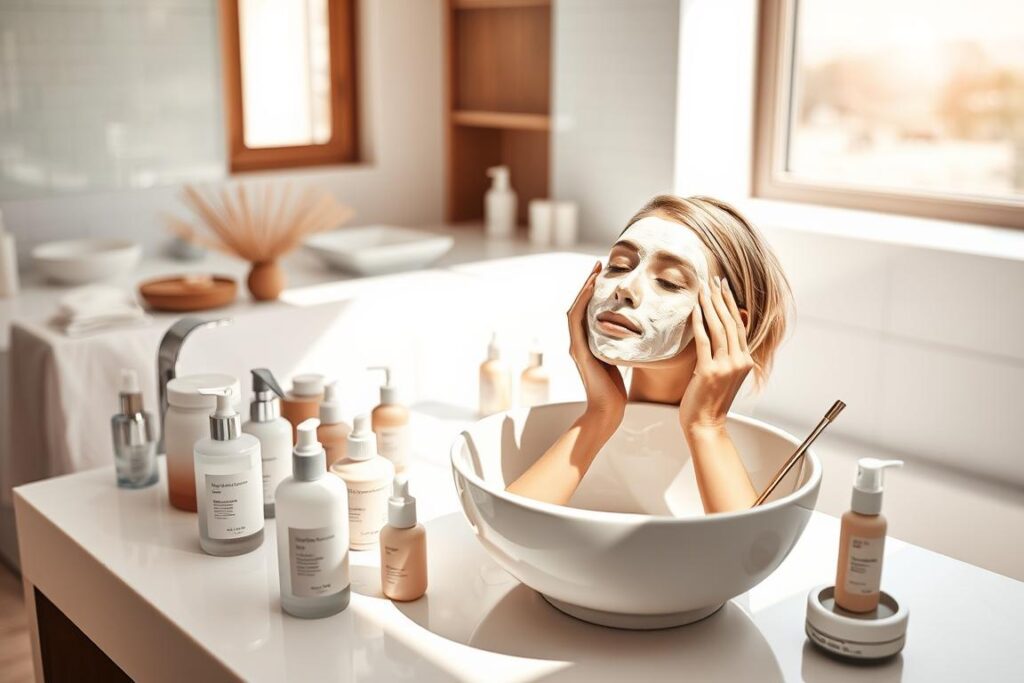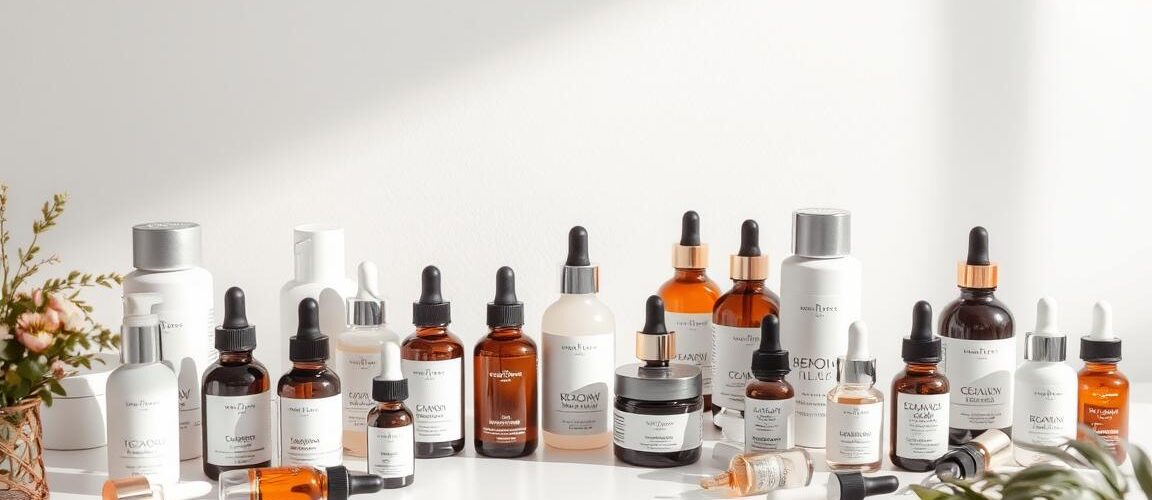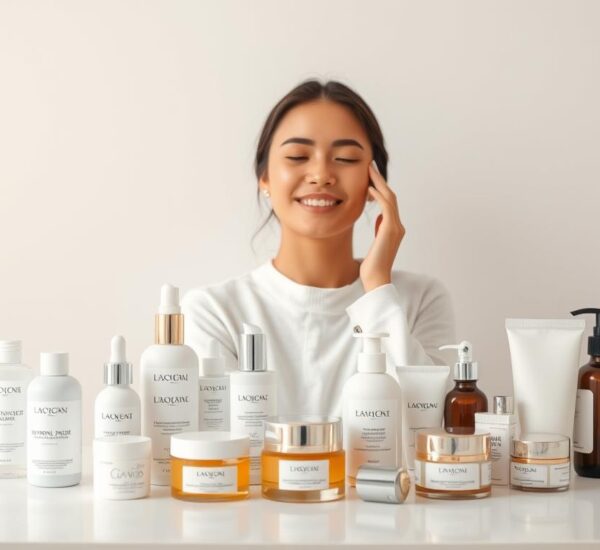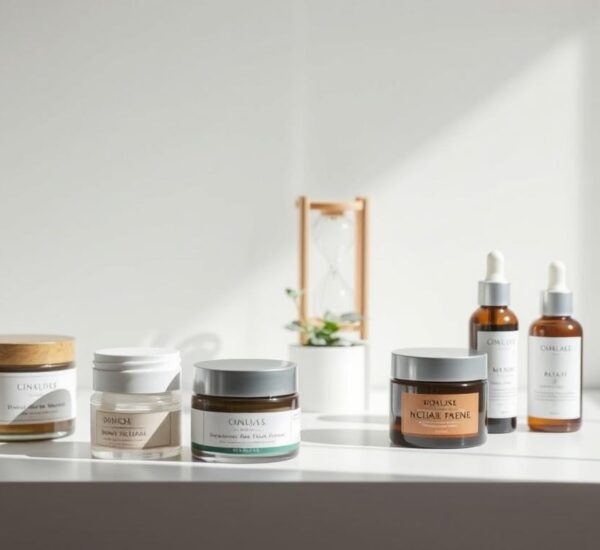Are you tired of using skincare products that don’t quite work for your skin type? You’re not alone. With so many products out there, finding the right daily skincare routine can be tough.
Experts say getting your skincare routine right is simple. It’s all about a customized approach for your unique skin. By knowing your skin type, concerns, and goals, you can make a plan for healthy, glowing skin. For example, you can try making a homemade rosehip oil serum for anti-aging benefits.
Key Takeaways
- Understand your skin type and concerns to create a customized plan.
- Choose products that address your specific skin needs.
- Establish a consistent daily skincare routine.
- Be patient and adjust your routine as needed.
- Consider using natural ingredients for added benefits.
Understanding Your Skin Type
The secret to a great skincare routine is knowing your skin’s unique traits. Each skin type has its own needs. It’s vital to pick the right products and treatments for your skin.
By doing this, we can make our skincare routine steps work better. This helps tackle issues like acne, dryness, or sensitivity.
Oily Skin Characteristics
Oily skin has large pores and looks shiny. This is because the sebaceous glands work too hard. It’s more likely to get acne and blackheads.
To handle oily skin, we need products that control oil. But they should not dry out the skin.
Dry Skin Characteristics
Dry skin has small pores and looks dull. It happens when the skin doesn’t make enough oil. This leads to dryness and sometimes irritation.
Moisturizing is key for dry skin. Using hydrating products helps keep moisture in.
Combination Skin Characteristics
Combination skin has oily and dry areas. The oily T-zone (forehead, nose, and chin) is usually oily. The cheeks are dry.
Managing combination skin means finding products that balance. They should control oil in oily areas and hydrate dry ones.
Sensitive Skin Characteristics
Sensitive skin reacts quickly to products or the environment. This can cause redness, itching, or irritation. It’s important to use gentle, fragrance-free products.
Avoid harsh ingredients to prevent reactions.
Knowing our skin type helps us create a better natural skincare routine. This routine addresses our specific needs. It leads to healthier and more balanced skin.
The Importance of a Consistent Routine
Having a regular skincare routine is key to getting healthy, glowing skin. It helps tackle problems like acne, dryness, or aging signs. A steady routine keeps your skin healthy and looking good, making sure it gets the care it needs.
Benefits of Daily Skincare
A daily skincare routine is the foundation of good skincare. It includes steps to clean, nourish, and protect your skin. The key benefits of a daily skincare routine are:
- Improved skin texture and tone
- Reduced appearance of fine lines and wrinkles
- Enhanced skin hydration
- Better control over acne and other skin issues
How Consistency Affects Skin Health
Being consistent with your skincare routine is vital for your skin’s health. It makes sure your skin gets the care it needs every day. This consistency leads to:
- Maintaining the skin’s natural barrier
- Preventing issues like dryness and irritation
- Supporting the skin’s natural regeneration process
Also, a consistent routine lets you see how your skin reacts to products. You can then adjust your skincare to fit your skin’s needs better.
Essential Skincare Products You Need
A good skincare routine needs a few key products. These products work together to keep your skin healthy and glowing. By using the right products, you can tackle specific skin problems and keep your skin in top shape.
Cleansers: The First Step to Clean Skin
Cleansers are the base of any skincare routine. They remove dirt, oil, and impurities that can clog pores and cause skin issues. For dry or sensitive skin, choose a gentle, non-foaming cleanser. Oily skin might do better with a foaming or gel cleanser.
Using natural ingredients or medical-grade products can also make a big difference.
A gentle cleanser with natural oils can remove heavy makeup and cleanse without drying out your skin.
Toners: Balancing Your Skin’s pH
Toners are key in balancing your skin’s pH and getting it ready for other products. They can tighten pores, reduce fine lines, and add extra cleansing. Look for toners with witch hazel or aloe vera to soothe and calm your skin.
Moisturizers: Hydration is Key
Moisturizers are vital for hydrating and nourishing your skin. They lock in previous products and protect against environmental stressors. For dry skin, a rich moisturizer is best. Oily skin might prefer a lightweight, oil-free option.
Moisturizers improve skin elasticity, reduce fine lines, and keep your skin hydrated.
Sunscreen: Protecting Against UV Damage
Sunscreen is a must-have for protecting your skin from UV damage. This damage can lead to premature aging, dark spots, and even skin cancer. Choose a broad-spectrum sunscreen with at least SPF 30. Go for a lightweight, non-comedogenic formula for daily use.
Daily sunscreen use greatly reduces UV-related skin damage. It’s a key part of your daily skincare routine.
Building Your Morning Skincare Routine
A morning skincare routine is more than just cleaning your face. It prepares your skin for the day, protects it from harm, and boosts its natural shine. Adding a few simple steps to your daily routine can greatly improve your skin’s health and look.
Step-by-Step Morning Routine
To make a great morning skincare routine, follow these key steps:
- Cleansing: Begin with a gentle cleanser to wash away last night’s dirt and get your skin ready for what comes next.
- Toning: Use a toner to even out your skin’s pH and close pores. This makes your skin smooth for makeup or other products.
- Moisturizing: Moisturize your skin with a product that fits your skin type. This helps keep the benefits of previous steps and supports your skin’s natural defense.
- Sunscreen: End with a broad-spectrum sunscreen (at least SPF 30). This protects your skin from UV rays, preventing early aging and skin cancer.
For extra benefits, add a serum or eye cream to your routine. They target issues like dark circles, puffiness, or fine lines.

Quick Morning Tips for Busy Days
On hectic mornings, it’s tempting to skip skincare. But, you can simplify your routine. Here are some tips:
- Use a multitasking product that does several things at once, like a moisturizer with SPF.
- Try a quick, 30-second cleanse or use micellar water for a fast clean.
- Keep your skincare products organized and within reach to save time.
For more tips on making your morning routine better, see our guide on morning yoga poses to boost circulation for dull skin. It can enhance your skincare routine.
Building Your Evening Skincare Routine
To get healthy, glowing skin, you need a good evening skincare routine. It should match your skin type and needs. The evening is perfect for skin repair and rejuvenation.
Step-by-Step Evening Routine
Start with cleansing to get rid of dirt, makeup, and impurities from the day. Then, use toning to balance your skin’s pH. This step prepares your skin for what comes next.
After that, apply a targeted treatment or serum. This can help with acne, aging, or dark spots. Finish with moisturizing to keep your skin hydrated and protected all night.
- Cleansing: Remove dirt and makeup.
- Toning: Balance skin pH.
- Targeted Treatment: Address specific skin concerns.
- Moisturizing: Hydrate and protect.
Nighttime Treatments for Deeper Repair
Nighttime treatments are great for deeper repair and nourishment. Products with retinol, peptides, or hyaluronic acid are best at night. They help repair and rejuvenate your skin while you sleep.
Try adding a night cream or overnight mask to your routine. It gives your skin an extra dose of hydration and repair. You’ll wake up with smoother, more radiant skin.
Exfoliation: How and When to Do It
To get healthier, brighter skin, add exfoliation to your skincare routine steps. It removes dead skin cells, helping your skin look better. Knowing how to exfoliate right can make your natural skincare routine even better.
Types of Exfoliators
There are two main kinds of exfoliators: physical and chemical. Physical ones, like scrubs and brushes, scrub off dead skin. Chemical ones, like AHAs and BHAs, break down the ‘glue’ that holds dead skin cells together. For dry skin, gentle exfoliation once a week is best. For deeper exfoliation, use medical-grade products.
Benefits of Regular Exfoliation
Exfoliating regularly has many benefits. It makes your skin smoother, reduces fine lines and wrinkles, and brightens it. Adding exfoliation to your routine can give you a more even skin tone and smaller pores.
The Role of Serums and Targeted Treatments
Serums and targeted treatments add extra nourishment to your skin. They tackle specific issues that moisturizers and cleansers might miss.
Serums are concentrated formulations with more active ingredients than other products. They deeply penetrate the skin, making them great for many skin problems.
What Are Serums?
Serums are key in your skincare routine, making a big difference. They are light and focus on specific issues like acne, dryness, or aging. Using a serum can improve your skin’s health and look.
The main features of serums include:
- High concentration of active ingredients
- Lightweight texture for better absorption
- Targeted approach to address specific skin concerns
How to Choose the Right Serum for Your Needs
Choosing the right serum depends on your skin type and concerns. For dry skin, look for hydrating serums with hyaluronic acid. For aging concerns, serums with retinol or peptides are good.
Here’s a comparison table to help you choose the right serum based on common skin concerns:
| Skin Concern | Recommended Serum Ingredients |
|---|---|
| Dryness/Hydration | Hyaluronic Acid, Glycerin |
| Acne | Salicylic Acid, Benzoyl Peroxide |
| Aging | Retinol, Peptides, Vitamin C |
When picking a serum, think about its formulation and how it fits with your routine. Some are for morning, others for night.
Adding the right serum to your daily routine can tackle specific skin issues. This leads to a healthier, brighter complexion.
Natural Ingredients to Incorporate
Adding natural ingredients to your skincare can change your skin for the better. Learning about the benefits of these ingredients can boost your skincare game.
Ingredients like aloe vera, vitamin C, and hyaluronic acid are great for the skin. Let’s explore what makes them special.
Benefits of Aloe Vera
Aloe vera is known for soothing and calming the skin. It’s perfect for sensitive skin because it reduces inflammation and irritation. It also keeps your skin hydrated, making it soft and refreshed.
Advantages of Vitamin C
Vitamin C is a strong antioxidant that protects your skin from harm. It brightens your skin and reduces wrinkles and fine lines. Adding vitamin C to your routine can make your skin look younger and more radiant.
Importance of Hyaluronic Acid
Hyaluronic acid holds a lot of moisture, making it great for hydrating your skin. It fills in wrinkles, making your skin look smoother. Using hyaluronic acid products helps keep your skin moist and healthy.

Using these natural ingredients in your skincare routine can be both effective and gentle. Start simple and add more as your skin gets used to them.
Understanding the Impact of Diet on Skin
The link between diet and skin health is clear. A balanced diet is key to keeping our skin healthy. It’s not just about looking good; it’s about feeling good too.
Our diet affects our skin in many ways. Eating foods full of antioxidants, like berries and greens, protects our skin. Foods with omega-3s, like salmon, help fight inflammation and can reduce acne.
Foods That Promote Healthy Skin
Some foods are better for our skin than others. Here are a few:
- Berries and other antioxidant-rich foods: Berries are full of antioxidants that protect our skin.
- Fatty fish: Fatty fish like salmon are great for reducing inflammation.
- Nuts and seeds: These are full of healthy fats and antioxidants that are good for our skin.
Eating these foods can help our skincare routine and might even cut down on the need for extra products.
Hydration and Its Effect on Appearance
Drinking enough water is vital for our skin’s health. It keeps our skin hydrated and makes it look better.
When we drink enough water, our skin works better. It can regulate temperature and protect us from the outside world. This, along with a good diet, makes our skin look and feel great. It’s a big part of our best skincare products plan.
Knowing how diet and skin health are connected helps us make better choices. This leads to healthier, more glowing skin.
Seasonal Adjustments for Your Skincare Routine
As the seasons change, our skin’s needs change too. We need to adjust our skincare routine to meet these new needs. This helps address issues like dryness, oiliness, or sun damage, keeping our skin healthy and radiant all year.
Summer Skincare Tips
In summer, our skin faces higher temperatures and humidity. This can cause more oil and sun damage. To fight this, we should use lightweight, oil-free products. These won’t clog pores and offer good sun protection.
- Use a broad-spectrum sunscreen with at least SPF 30 daily.
- Apply a toner to balance your skin’s pH.
- Stay hydrated by drinking plenty of water.
Winter Skincare Strategies
In winter, cold weather and low humidity dry out our skin. To combat this, we should focus on intensive moisturization and protection.
- Use a rich, hydrating moisturizer to lock in moisture.
- Exfoliate regularly to remove dead skin cells.
- Protect your skin from harsh winds and cold temperatures.
Common Skincare Myths Debunked
It’s important to debunk skincare myths to make a routine that works. Many follow tips without checking if they’re true. It’s key to know the difference to get the best skin.
Skincare myths can harm our skin. Knowing these myths helps us improve our routines. This way, we can tackle issues like acne, aging, or sensitivity better.
Myths About Acne Treatments
Acne treatments are often misunderstood. One myth is that poor hygiene causes acne. But, acne is mainly due to genetics, hormones, and clogged pores.
Another myth is that natural products are always good for acne. While some natural items help, others can irritate or clog pores. It’s important to know what’s in them.
| Myth | Reality |
|---|---|
| Acne is caused by poor hygiene. | Acne is mainly due to genetics, hormones, and clogged pores. |
| Natural products are always better for acne. | Some natural items can irritate or clog pores, so it’s key to know the ingredients. |
Misconceptions About Aging Skin
Myths about aging skin are common. One myth is that anti-aging products can reverse aging completely. While they can improve aging skin, they can’t stop aging.
Another myth is that sun damage only affects those outdoors. But, UV rays can get through windows and cause damage. So, protecting your skin from the sun every day is important.
By debunking these myths, we can make better skincare routines. Whether it’s acne, aging, or other issues, knowing the truth helps us get healthier, brighter skin.
Professional Treatments to Consider
As we work on our skincare routine, we might think about adding professional treatments. These can give our skin extra care and attention. They help with issues like acne, aging, or dark spots.
Enhancing Your Routine with Facials
Facials can be a great addition to our skincare routine. They help deep clean and nourish our skin. This can make our skin look more radiant and healthy.
Seeking Professional Advice
Before trying treatments like facials, chemical peels, or laser therapy, get advice from a skincare expert. They can find the best treatment for your skin. This ensures you get the most from your skincare routine.



